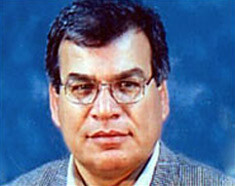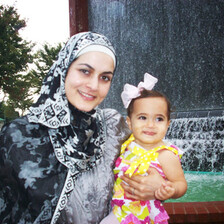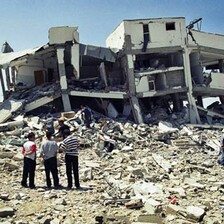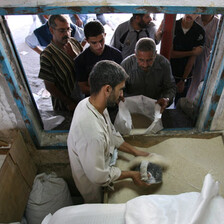Al Jazeera 6 August 2005

Mohammad Samhouri
In the face of all this, Mohammad Samhouri has been assigned the task of coordinating the withdrawal on the Palestinian side. Samhouri, a US-educated economist by training, oversees a team of 40 experts who are handling the post-disengagement process, including what’s to be done with the evacuated land and remaining assets.
Aljazeera.net spoke to Samhouri in his Gaza office about the disengagement that is set to start on 15 August, the importance of free access for Palestinians and the future of Palestinian economy.
Mohammad Samhouri: Before we begin, I just want to give you some advice to make your job easier. Don’t ask me political questions, because I don’t have political answers.
Aljazeera.net: Noted. What exactly are you tasked with doing?
I am the general coordinator of the Technical Committee Following Disengagement. I oversee a team of 40 experts who are handling the disengagement on the Palestinian side from a technical point of view.
And that means?
We will be following up on Israeli withdrawal, through this technical committee that is comprised of members from PA ministries and agencies plus some representatives from the private sector and from NGOs (non-governmental organizations).
Basically we are working on three main blocks of issues.
The first block is land and assets that supposedly the Israelis will evacuate in a couple weeks. We need to figure out what these assets are - agricultural, industrial, electricity, power, roads, infrastructure, housing units - and what to do with the debris and rubble when they are demolished, and what mechanism we should adopt in order to go ahead and get those assets. So the transfer mechanism - this is one block - preparations for technically being ready for the transfer of land assets when Israel evacuates.
The second major block of issues is related to access and movement, border crossings, all ports, territorial link between Gaza and the West Bank and internal closures within the West Bank.
The third major block of issues is related to what to do with the land in the long term. We are gaining back 25% of the Gaza Strip’s land, with a population of 1.5 million that is increasing by 4% yearly. So this is a major challenge - how to use everything here optimally.
We are talking about a small area of land with 1.5 million people. So what is to be done when you have 3 million people living here in 20 years’ time?
To what extent is there coordination with the Israelis?
It is minimal. We still didn’t get a single bit of information about what exists in the settlements. All that we have is information you can easily get when you do a Google search.
For the Israelis, the entire project was unilaterally designed, and when the world changed with Abo Ammar’s (Yasser Arafat) death, they wanted some sort of coordination. Our understanding of coordination is different from theirs.
Their understanding is to use us for a cover-up to implement their own vision and plan. Our understanding is to solve all issues related to what exists currently in the settlements, so we can plan in a way that can help us prepare for the future.
Their plan doesn’t speak anything about access, sovereignty or a West Bank-Gaza link. All they want is to get the settlers and army out of Gaza and keep overall control over the place. That’s not our vision.
So in terms of coordination, it is a long, tedious, silly, non-productive process so far, although there is some international pressure on the Israelis to get their act together and do what is needed.
What specific changes would you like to see?
We desire coordination to gradually ease up restrictions for cargo and individuals, and go back to plans for building a sea port and reconstruct the airport and have it fully operational in due time.
What we want is secure and fast trade. Security dictates everything of importance to us and to them.
We want to end once and for all the “back to back” system of cargo delivery at Karni, which entails reloading the goods from one truck to another, because everything says this is not giving a chance for the private sector. We are asking for door-to-door delivery instead and a bigger terminal for Palestinian labourers at Erez crossing. The movement on the border is killing the Palestinian economy. The technology exists to remove these restrictions, but the Israelis are not convinced to use them. This is our concept of coordination. It’s not just to make life easy for the Israeli settlers and army, but also for us.
What will happen to Gaza’s airport after disengagement?
Nothing has really been agreed upon. The Israeli argument is that we live in a post-9/11 world, and whenever we bring it up, they say, “We’ll talk about it later.”
And the sea port?
Israel initially agreed to the idea. The Oslo Accord gave us that right. But beyond a general statement, we haven’t been given clear answers when we attempt to discuss details, though the sea port is not as big a problem as the other ports.
What of the commodities that will be left behind in the settlements?
We’re not sure what will be left to us. The Israelis might have certain plans now, but during and after the evacuation things may be very different. Palestinians are mainly concerned about the greenhouses. Some of them are being dismantled. But even in the best case scenario, if they are left intact, the marketing channel is an issue.
What makes agricultural products profitable is direct access to the end consumer. If agricultural products are not delivered on time, if they are stuck for even one day at Karni [industrial crossing], they are of no use. If there is no free access to Israel and the outside world for all products, the greenhouses and other commodities left behind will be of no value to us.
What major challenges do you face after disengagement?
Immediately following disengagement, we face the challenge, again, of access. If we are promised huge international financial assistance, we want to be able to use it, and we cannot use it effectively and optimally unkess we have access to the outside world.
Everything is related to access. Without removing restrictions on access, without free movement for people, for vehicles, for products, then, after the Israeli departure, apart from the joy of seeing the occupiers leave, not much will happen in terms of tangible improvement for the lives of people and the economy. If closures and restrictions are not removed, then Gaza’s future will be in doubt.
If you gradually reduce the Israeli hegemony on our economic sector, we can start building our own economy in a way that gives us some freedom to contact the outside world. That cannot happen if the Israelis maintain full control over access.
In the medium term, the challenges we face are to create jobs and reduce poverty, in a society where two-third of the population is defined as poor by international standards and 35%-40% of the people are unemployed. This figure goes up to 60% if you focus on the youth.
In the long term, the main challenge is how to run Gaza under very restrictive terms, and this is not for me to answer as it is a political question.
You’ve mentioned there are plans in the works for the evacuated land. What do they entail?
The Ministry of Planning made a Gaza regional development plan in the late 1990s. At that time, Israeli withdrawal was not a known factor, and settlements were in the plan but not fully integrated.
Now there is an exercise to update the plan and reintegrate the settlement areas back into it with a vision for the next 20 years, when Gaza will house 3 million people. The plan includes green areas, industrial areas, infrastructure, housing, etc. The Ministry of Planning’s job is to design such a plan and set it up, and for the government to tender parts of these plans to the private sectors to develop these areas.
Can you create a viable Palestinian economy in a tract of land less than 350 sq km in size, given all the challenges you’ve mentioned?
This question has an obvious political dimension. We are talking here about the viability of a Palestinian state. We can’t just focus on Gaza or we are playing the Israeli game.
Often while discussing the disengagement what will happen is that we forget this, that we are also dealing with the wall in the West Bank, and with settlement growth there. All of this is killing viability of a Palestinian entity. When we talk about the future of Gaza, it has to be as part of the Palestinian entity, including the West Bank and Jerusalem.
What about the future of the Rafah crossing?
Rafah depends on talks with Egypt. In addition to the politico-strategic disengagement from Gaza, Sharon has said that eventually, he wants also to disengage economically, as well. The idea is that by the end of 2008, there will not be a single Palestinian worker from the West Bank or Gaza working in Israel. Their view also says that if they leave Gaza completely, meaning Rafah and the Philadelphi corridor (a zone along the border with Egypt) too, they will abrogate the Paris Protocol that governs our economic relations with Israel.
How will abrogating the Paris Protocols so abruptly affect the Palestinian economy?
It will have fiscal repercussions. Right now, Israeli customs apply to Palestinian imports, and clearance revenues are re-routed to the PA. There are transfer duties on direct imports, but not on indirect imports, which is a $180 million loss for us. If this customs envelope that we share is abrogated, as the Israelis desire, it will mean a 5% GDP loss on duties for the Palestinian economy.
And what does the Israeli government have to say?
So far, there has been no word on whether the Israelis will agree to maintain it. The World Bank and the EU are pressing them, in order to avoid heavy losses for the Palestinian economy in case of abrupt economic disengagement. In the meantime, we want to review how the [Paris Protocol] can be fixed. There is a joint economic committee to discuss this issue; but it has never met.
We do not want them to be our major trading partners; but one of our major trading partners. As things stand, they are forcing on us that they be our major point of export and import. So, although we do no want to sever economic ties, we do not want to restrict transactions,either. That’s why we need access - so we can diversify our economy.
All in all, are you optimistic about Gaza’s future following disengagement?
You cannot say, in many issues, whether you are optimistic or not. In this case it depends on three things: First, how much we understand what we want in terms of access. If there is no easy access, disengagement will not be successful. We have to understand this, because sometimes we focus on the smaller issues. It is about A-C-C-E-S-S. If you don’t have it, it is a big problem.
For Israelis, the issue is to realize that in the long term, it is in their interest to understand the implications of maintaining this stupid policy of closure and restrictions. In the long term, it will fire back because you are putting pressure on an impoverished, overcrowded people, and, sooner or later, it will get back to you.
And finally, the international community must understand it is not money that will solve the problem. Giving us a couple of billion dollars is necessary, but not sufficient. They need to put political pressure on the Israelis.
Laila M. El-Haddad is a journalist based in the Gaza Strip. This interview was originally published on July 31, 2005 by aljazeera.net and reprinted on EI permission.
Related Links





